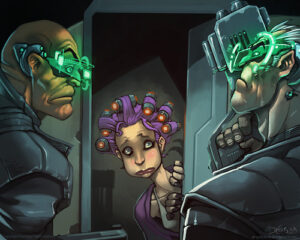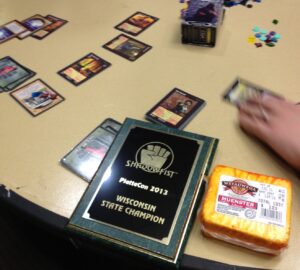After the legendary Guardian Heroes appeared on XBLA we’ve had some good times with it and people likely noticed! Looks like the team that did the gorgeousity that is Odin’s Sphere on the PS2 have queued up a very similar title to the revered Guardian Heroes: Dragon’s Crown. Please note the female proportions present in the illustrations.
Fall Back
Reader falls from the Googlecunt
Google Reader will be cancelled in July. This is a service that I use daily and there isn’t a good replacement (yet). This got me thinking about the whole free-software as a service model we seem to have swallowed as a culture. Web based emails is email is email, an online drive is meh, web-based calendars are just annoying (because you have multiple-on your phone, on your wall, on your computer, on your cloud based service) and maps? Well that’s pretty essential– but they don’t really need to show me where I am at– I KNOW that so it’s not something worth individualizing. Sharing? Please– who gives a shit? Given that all these web-based tools are free because they monetize their userbase it’s quite nice for us users who would normally have to pay for such services— however the free model means that the owning company can simply shut down any service it doesn’t like without any contractual issues with it’s clients. So giving free means taking away whenever and however.
That said, do we really want to use free software ever? Is the concept of free software (where WE as users are the actual product for the people that really pay Google and the like for our information) something that we should all examine a lot more closely?
Frankly I would rather have paid or have a monthly payment for my feed reader and will do so in the future, ideally for an application where I can choose to update or not– but we were all cajoled into thinking free is a good idea back in 2006 or so– that cajoling that free is good is, in fact, Google’s business model. We give you, our product (which is the users,) something for free and we monetize your use and interest in that product. Now instead of paying for a hard drive, you can get one for free online where you can store your stuff. Your mail communications are all online as well. What will happen when Google decided to get rid of Drive and Google Plus–or even MAIL? More likely these will eventually change to such a degree to make them unusable for the original adopters Just like Reader and Google Wave, they have zero obligation to you as a user to keep that service running since it’s free and also not a free application (it’s a software as a service). So if said piece of software isn’t a service that generates revenue for their actual customers, it will eventually be cut away to cut costs for services that do.
The main issue is that Google, Facebook, Yahoo, etc. have actual products that they sell to clients, but it’s not something ANY of us would want to buy for the most part; yet we are the ones that actually generate this revenue for these service providing companies, whether it’s by our searching or using free services or allowing a company to monetize our personal connections. We are their product. The bottom line is, if you use a free service, assume that it will either be changed or go away at the whim of the provider, i.e.: it CANNOT BE RELIED UPON.
Some Total War stuff
Looking at the Rome Total War 2 videos (battle of Teutoburg Forest here):
Other than pissing myself with glee after, during and before watching the above video, I sparked up Rome Total War: Barbarian Invasion this weekend and just had to record it and make inane commentary. If you haven’t played the series, RTW 2 is likely to be the best there is.
The awesome aspect of the Barbarian Invasion expansion is the concept of Hordes. When a faction is bereaved of it’s last city it turns into a horde– a mass of 5-6 army groups filled with the basic troops of that faction and a few other units sprinkled in. This represents the people themselves fleeing en masse from their fallen city. The faction then either has to take and settle an enemy city (and everyone is an enemy at this point) or dwindle away to nothing via attrition. These Hordes pop up constantly during the game and thus you never know when a massive beast of an army will wander over the horizon and into your carefully crafted territories. If you play as a western European faction, you will see fewer of these but they will have greater effect because the factions their are right on top of each other. Playing in the East, where cities are far more spread out, Hordes are everywhere mostly due to the Huns destroying city after city and sending waves of Vandals, Samartians and Roxolani into western Europe. What all this adds up to is an extremely dynamic campaign situation, one where you are not simply grinding down the nearest factions– you have to keep an eye on all of Europe to safeguard against the destruction one of these hordes can cause– whether it’s on your nearest enemy or on your faction.
Revisiting Netrunner

Looking at the copyright dates from the original Netrunner makes me feel old. Very old. 1996 was a long long time ago and things have changed quite a bit with the hacking and, of course, with CCGs. While they were riding about as high as you could imagine a game for nerds would be in 1996, very few have survived. Most, like the original Netrunner, they died off after a short run or even one set (SUPER DECK!). We can count on one hand the number of CCG’s that are left and active; even the big names are now gone or changed over to the LCG format (Jyhad, Shadowfist). Yet MTG is alive and going very strong– so there is a market for collectible card games out there and Netrunner, now number 6 on Boardgamegeek.com, is scratching away at that itch–and it feels real good.
15 years is a long time–as I said, quite a few of the things that were friggin’ science fiction in the original Netrunner are a REALITY now, such as all the touch screen walls and iPads and whatnotall that we waste all this time with when we should be outside or cleaning the house. Going through the old cards, there are a few choice pieces of art, and the cards themselves are that old school thickness, but overall the design is dark and crappy and the art for the most part consists of a photo of someone that has been computerized (Codeslinger) or some Maya-driven 3d abortion (SeeYa). The beauty (and financial failure) of the original Netrunner is that you could have a bunch of fun with just two starters and two boosters– so much so that there was very little desire to buy anything else for the game. What’s more, the lack of any ‘clans’ type thing did little to inspire– there were just generic runners and generic corporations going at it. I think players with games like this with hundreds of cards NEED some sorts of divisions, however arbitrary, to sort things out for them.
In any case, I went in for the Fantasy Flight version of Netrunner, now an LCG, and I have had the opportunity to play it a few times. While I remember the old game as being solid, we only played it 20 or so times and never bought any new cards. This is the very reason Netrunner is absolutely perfect, probably THE most perfect, game for the LCG format. You will get a ton of play out of the base set and it’s seven potential decks (3 for the runner, 4 for the corps). Granted you have to switch out the neutral cards to make a complete deck, this is a small price for the asymmetric decks on top of asymmetric sides.
How is the new set? Frakin’ Great. The art and design is far better than the rather dark, cloudy cards from the ’96 version, the rules are cleanly and clearly presented. The big difference, and it’s a good’un, is that both the Corp and the Runners now have an avatar card of sorts that has some power or effect (like doing damage when an agenda is accessed). So you start by selecting your faction, then one of the avatars within that faction (i.e.: Wizzard or the Waylan Corporation). The runner side has actual people, and the corp has some different powers for the same Corp. You can surprise your opponent with your choice here, especially due to in my first few plays I forgot to even look at the avatar power before it bit my virtual buttcheek.
Dominions 3 on Steam Green Light
Dominions 3 is trying to get on Steam. It is the best Fantasy Strategy game in existence– and it looks bad and has a tough interface with ridiculously amateur sound effects– and yet everything they needed to nail in a strategy game they NAILED TO THE GIANT ICE WALL. The depth and minutiae is amazing to behold.
Give it your vote here.
Nostalgia madness
WOTC has been hitting the old School D&D hard since the announcement of 5th edition– with the reprints of both 3.5 and the original AD&D hardcovers, it’s like 1979 and 2002 all over again. Showing how far they are willing to go to rope in the nostagists (the 40+ who still play the 1981 boxed editions)– they are now reprinting the original white books (or tan) that kicked off this insane hobby in the first place.
I’ve seen these in the past and read through them a bit (I found one randomly on a dude’s porch one day outdoors) and I have to say it’s pretty much all nostalgia if you want to have these. It’s not that the rules are shit or anything, it’s just that we have moved FAR beyond what these guys started back in the 70’s. I can see sticking with the Basic D&D from 1981– but not this far back. Not that I don’t sort of want these…even if the art isn’t great.
Vergara
Feeling Cheesey
I pulled out a win in the finals of the Shadowfist 2013 big cheese tournament. Seeing as I didn’t make a deck for the event and hadn’t played in awhile, this was surprising. What wasn’t surprising was that Steven Wu with Four Mountain Fist went in for the winning attack. This shouldn’t surprise anyone. The decklist (the A-LIST) and for now: cheese.


